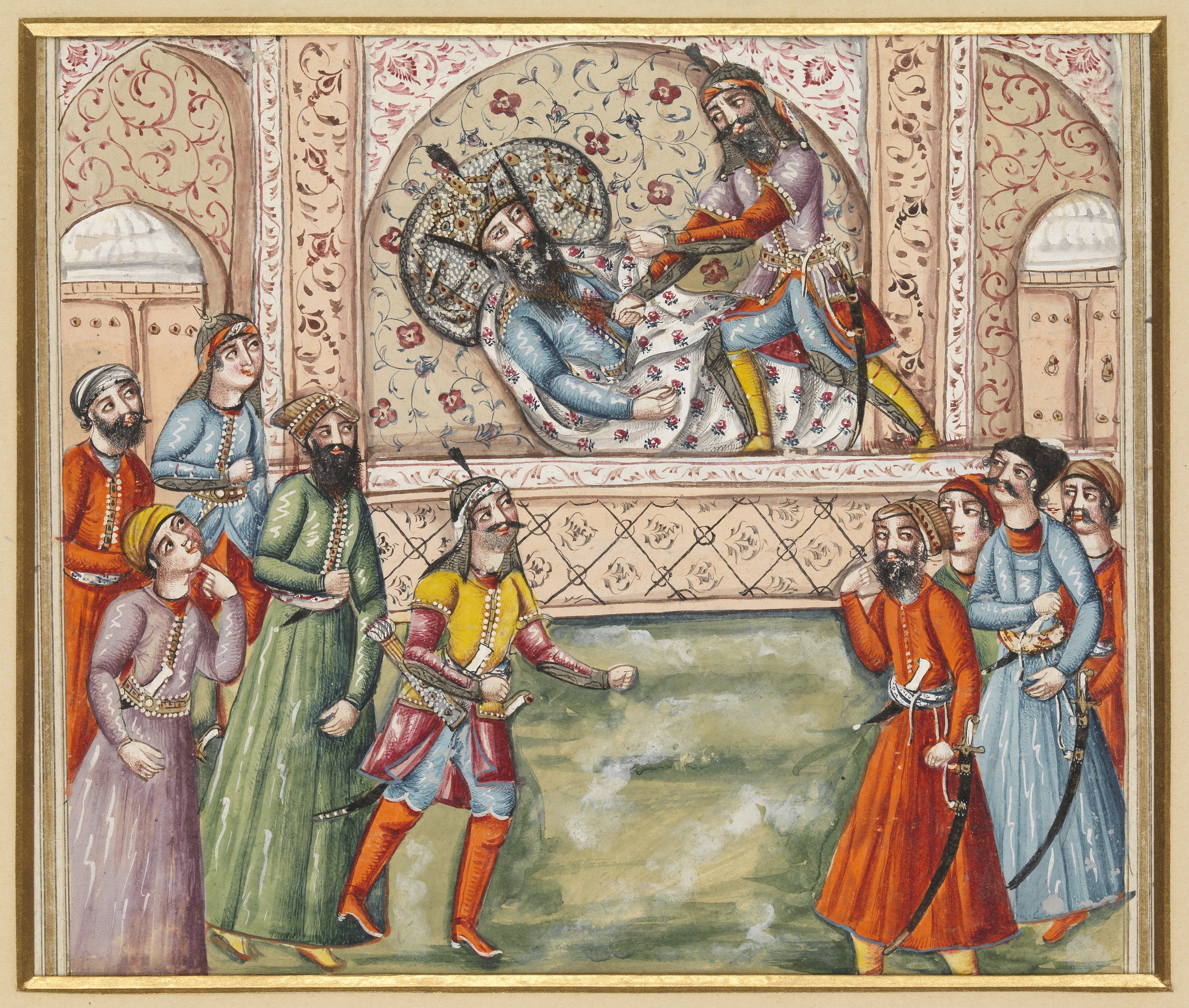|
Irbis Seguy
Irbis Shekui Khagan (full title: Yǐpíshèkuìkĕhàn 乙毗射匮可汗) (r. 642–651) was the penultimate ruler of the Western Turkic Khaganate. He was linked to the Nushibi faction and was son of El Kulug Shad. Reign In 642, he overthrew Yukuk Shad (r. 638–642) with support from the expanding Tang dynasty Chinese. Although Yukuk Shad was still active and controlling a part of the territory, Irbis Shekui had the support of Nushibi (western) tribes. During the early years of his reign the rivalry between the Nushibi and Dulu factions cooled off. In 646, he sought a Chinese princess for his bride. In return, Emperor Taizong of Tang demanded the return of several Tarim Basin cities. When this was refused the Chinese invaded the Tarim. Two years later several Dulu leaders took refuge in China. With them the khaganate also lost Dzungaria to China. Later in his reign, Ashina Helu rebelled against him in 646, but was defeated. In 651 he was overthrown by Ashina Helu who was ... [...More Info...] [...Related Items...] OR: [Wikipedia] [Google] [Baidu] |
Tang Campaign Against Kucha
The Tang campaign against Kucha was a military campaign led by the Tang dynasty general Ashina She'er against the Tarim Basin oasis state of Kucha in Xinjiang, which was aligned with the Western Turkic Khaganate. The campaign began in 648 and ended on 19 January 649, after the surrender of the Kuchan forces following a forty-day siege in Aksu. Kuchean soldiers tried to recapture the kingdom with the assistance of the Western Turkic Khaganate, but were defeated by the Tang army. Background Kucha, a kingdom in the Tarim Basin, was a vassal of the Western Turkic Khaganate. Under the reign of Emperor Gaozu, the king Suvarnapushpa ( Chinese: 苏伐勃𫘝 ''Sufaboshi'') provided the Tang court with tribute in 618. In 630, Suvarnapushpa's successor Suvarnadeva (Chinese: Sufadie) submitted to the Tang as a vassal. A Buddhist of the Hinayana sect, Suvarnadeva had hosted the Buddhist monk Xuanzang when he arrived in Kucha during the same year. Kucha supported Karasahr when the oasis ... [...More Info...] [...Related Items...] OR: [Wikipedia] [Google] [Baidu] |
Ashina House Of The Turkic Empire
Ashina may refer to: * Ashina tribe, a ruling dynasty of the Turkic Khaganate * Ashina clan (Japan), one of the Japanese clans * Ashina District, Hiroshima, a former Japanese district * Empress Ashina (551–582), empress of the Chinese/Xianbei dynasty Northern Zhou * Sei Ashina (1983–2020), Japanese actress *Main setting of '' Sekiro: Shadows Die Twice'' See also * Asena, a mythical female wolf found in old Turkic mythology * Ashna (other) {{disambig, surname ... [...More Info...] [...Related Items...] OR: [Wikipedia] [Google] [Baidu] |
7th-century Turkic People
The 7th century is the period from 601 (DCI) through 700 ( DCC) in accordance with the Julian calendar in the Common Era. The spread of Islam and the Muslim conquests began with the unification of Arabia by Muhammad starting in 622. After Muhammad's death in 632, Islam expanded beyond the Arabian Peninsula under the Rashidun Caliphate (632–661) and the Umayyad Caliphate (661–750). The Muslim conquest of Persia in the 7th century led to the downfall of the Sasanian Empire. Also conquered during the 7th century were Syria, Palestine, Armenia, Egypt, and North Africa. The Byzantine Empire suffered setbacks during the rapid expansion of the Caliphate, a mass incursion of Slavs in the Balkans which reduced its territorial limits. The decisive victory at the Siege of Constantinople in the 670s led the empire to retain Asia Minor which assured the existence of the empire. In the Iberian Peninsula, the 7th century was known as the ''Siglo de Concilios'' (century of councils ... [...More Info...] [...Related Items...] OR: [Wikipedia] [Google] [Baidu] |
Irbis (Khazar)
Irbis ( 650 or 652) was according to a number of Russian sources the founder of the Khazar Khaganate. The Khazars traced their origin to the Turkic Ashina clan in modern Mongolia Mongolia; Mongolian script: , , ; lit. "Mongol Nation" or "State of Mongolia" () is a landlocked country in East Asia, bordered by Russia to the north and China to the south. It covers an area of , with a population of just 3.3 millio .... Peter Golden notes that Chinese and Arabic reports are almost identical, making the connection a strong one, and conjectures that Khazar leader may have been Irbis Seguy, who lost power or was killed around 651. References 7th-century Turkic people Khazar rulers 7th-century rulers in Asia {{history-stub ... [...More Info...] [...Related Items...] OR: [Wikipedia] [Google] [Baidu] |
Afrasiab West Wall
Afrasiab ( fa, ''afrāsiyāb''; ae, Fraŋrasyan; Middle-Persian: ''Frāsiyāv, Frāsiyāk'') is the name of the mythical king and hero of Turan. He is the main antagonist of the Persian epic Shahnameh, written by Ferdowsi. The mythical king and hero According to the ''Shahnameh'' (''Book of Kings''), by the Persian epic poet Ferdowsi, Afrasiab was the king and hero of Turan and an archenemy of Iran. In Iranian mythology, Afrasiab is considered by far the most prominent of all Turanian kings; he is a formidable warrior, a skilful general, and an agent of Ahriman, who is endowed with magical powers of deception to destroy Iranian civilization.Yarshater, E., "Afrasiab", ''Encyclopædia Iranica'' - digital library; accessed January 18, 2007. He is brother to Garsivaz, and the son of Pashang. According to Islamic sources, Afrasiab was a descendant of Tūr (Avestan: ''Tūriya-''), one of the three sons of the Iranian mythical King Fereydun (the other two sons being Salm and I ... [...More Info...] [...Related Items...] OR: [Wikipedia] [Google] [Baidu] |
Ishbara Qaghan (Ashina Helu) Ishbara Khagan (Old Turkic: 𐰃𐱁𐰉𐰺𐰀𐰴𐰍𐰣, Ïšbara qaγan, , personal name Ashina Helu - ) (ruled 651–658) was the last khagan of the Western Turkic Khaganate. Name The khagan's underlying Turkic name, transcribed with Chinese characters 賀魯, became a debate among scholars. Gumilyov proposed ''Hallïğ'', meaning "Elevated". Von Gabain proposed name ''Kullïğ'' (slave owner). Gömeç argued for ''Uluğ'' meaning "Great",. Meanwhile, Kapusuzoğlu proposed ''Kutluğ'' (Blessed) as his und |



